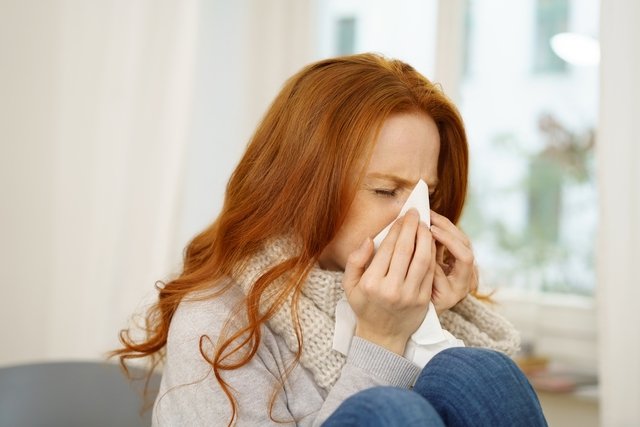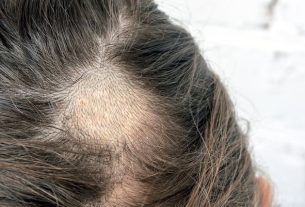The main symptoms of rhinitis are itchy nose, eyes and mouth, frequent sneezing, dry cough, runny nose, headache, red and swollen eyes.
Symptoms of allergic rhinitis usually appear as soon as one comes into contact with an allergenic substance, such as dust, pollen, perfume or animal hair, for example, which causes irritation and inflammation of the nose mucosa, resulting in the appearance of symptoms.
In the presence of rhinitis symptoms, it is important to consult a general practitioner or allergist to begin appropriate treatment according to the agent responsible for the symptoms, as this will help to avoid complications such as otitis, sleep problems or the development of chronic sinusitis. Learn more about allergic rhinitis.

Main symptoms
The main symptoms of allergic rhinitis are:
- Itching in the nose, eyes and mouth;
- Red eyes and nose;
- Excessive tiredness;
- Headache;
- Swollen eyes;
- Dry cough;
- Sneezing;
- Runny nose;
- Nasal secretion, which may or may not contain blood.
In addition, throat clearing may also occur, due to irritation in the throat and airways caused by excess secretion. See other causes of throat clearing.
The symptoms of allergic rhinitis appear as soon as you come into contact with the agent responsible for the symptoms, and are quite uncomfortable.
How to confirm the diagnosis
The diagnosis of allergic rhinitis is made through the patient’s report to the general practitioner, who will guide the patient towards appropriate treatment.
However, in severe cases, that is, when the allergic reaction disrupts the person’s life, with long sneezing attacks that can cause recurring headaches or weakness, for example, the general practitioner may refer the case to an allergist, doctor allergy specialist, who, through laboratory tests, will identify which substances are responsible for causing allergic rhinitis.
Make an appointment with your nearest doctor to investigate the possibility of rhinitis:
Taking care of your health has never been easier!
One of the tests that can be carried out is the immediate reading skin test, in which the person is exposed to small amounts of allergic substances on the skin, which may be on the arm or back, which become red and irritated if that is one of the substances that cause irritation. See how the allergy test is done.
Another test that can be done is the radioallergosorbent test (RAST), a type of blood test that measures the amount of antibodies called IgE, which are high when the person has an allergic reaction.
Possible causes
Allergic rhinitis occurs due to an exaggerated reaction of the immune system to allergenic substances, which causes the body to release substances, such as histamine, which cause obstruction of the inner layer of the nose, inflammation and excess mucus.
Some common allergens are pollen, dust particles, spores or animal dander, for example.
What to do to alleviate symptoms
To alleviate the symptoms of allergic rhinitis, it is important to identify and eliminate the agent responsible for the allergy, and the doctor may also recommend the use of antihistamines, which help to alleviate the symptoms. Discover the remedies for allergic rhinitis.
Furthermore, it is important that all dust is removed from surfaces, that the environment is well ventilated, avoid the use of carpets at home, use perfume with a more neutral smell and masks when cleaning the house, as this way it is possible to avoid new attacks of allergic rhinitis.
Bibliography
- NHS INFORM. Allergic rhinitis. Disponível em: <https://www.nhsinform.scot/illnesses-and-conditions/ears-nose-and-throat/allergic-rhinitis#causes-of-allergic-rhinitis>. Acesso em 13 set 2023
- NHS. Allergic rhinitis. Available at: <https://www.nhs.uk/conditions/allergic-rhinitis/>. Accessed on Aug 27, 2020
- BRAZILIAN JOURNAL OF OTORHINOLARYNGOLOGY. IV Brazilian Consensus on Rhinitis – an update on allergic rhinitis. 2017. Available at: <https://www.scielo.br/scielo.php?script=sci_arttext&pid=S1808-86942018000100003>. Accessed on Aug 27, 2020
- BRAZILIAN JOURNAL OF PNEUMOLOGY. Allergic rhinitis: epidemiological, diagnostic and therapeutic aspects. 2008. Available at: <https://www.scielo.br/scielo.php?script=sci_arttext&pid=S1806-37132008000400008>. Accessed on Aug 27, 2020

Sign up for our newsletter and stay up to date with exclusive news
that can transform your routine!
Warning: Undefined array key "title" in /home/storelat/public_html/wp-content/plugins/link-whisper-premium/templates/frontend/related-posts.php on line 12
Warning: Undefined array key "title_tag" in /home/storelat/public_html/wp-content/plugins/link-whisper-premium/templates/frontend/related-posts.php on line 13




